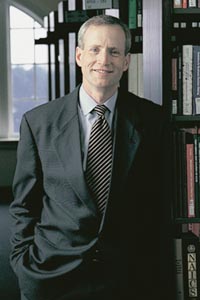Snyder chosen as new GSB Dean
 Edward Snyder (A.M., ’78, Ph.D., ’84) has been named Dean of the Graduate School of Business, effective Sept. 1. |
Snyder succeeds Robert Hamada, who is completing his eighth year as Dean. Hamada announced his intention to step down as Dean last year and remains a member of the school’s faculty.
“Ted Snyder combines experience of the University with real accomplishments in the world beyond it in a way that makes him the ideal Dean for our Graduate School of Business,” said Randel. “He will be a great leader for the school, a great citizen of the University and a great asset to the business community in the city of Chicago. I look forward very much to being his colleague, and I am grateful to the faculty search committee for the experience of working with them to bring him here.”
“I am honored to accept the Deanship of the Graduate School of Business at Chicago,” said Snyder. “My own educational experiences at Chicago, with its unrelenting focus on truth and the power of ideas, was transformational. I am excited and delighted to return to Chicago and again be part of its special community. Most important, I look forward to sustaining and strengthening the GSB, whose academic standards are recognized and admired worldwide.”
Before becoming Dean at Darden in 1998, Snyder was a faculty member at the University of Michigan’s business school, most recently serving as Senior Associate Dean with direct responsibility for faculty matters and professional degree programs.
“After considering more than 200 potential candidates, the dean’s search committee enthusiastically and unanimously recommended Ted Snyder,” said Milton Harris, the Chicago Board of Trade Professor of Finance and Business Economics in the GSB and chairman of the committee. “We believe we have found an outstanding Dean for the GSB. Ted has a deep appreciation for the research culture of the University, terrific administrative skills and a genuine commitment to building a strong sense of community among faculty, students and alumni.”
As dean at Darden, Snyder directed the first expansion in 23 years of the school’s M.B.A. program, increased the diversity of the student body, led a successful fund-raising drive, including a record $60 million gift from a single donor, and significantly increased the school’s executive education revenue. He also gained funding for a major campus construction project now underway. Darden’s integration of academics and professional development, including career services, generated, according to Business Week’s ranking last year, the largest rise in M.B.A.-student satisfaction among U.S. business schools.
According to the 2001 edition of Business Week’s Guide to the Best Business Schools, Snyder has “immersed himself” in his duties at Darden, having regular breakfasts and Sunday dinners with students at his home. He “is not just a figurehead or money-raiser,” Business Week reported, adding that he uses his time with students “to get feedback on what needs to be tweaked in the M.B.A. program and garner reactions to the changes he has made thus far.”
“The GSB has long been second-to-none in the discovery and teaching of new and important knowledge in business and economics,” said Dennis Keller, Chairman of the GSB’s business advisory council and chairman and CEO of DeVry Inc. “Ted Snyder will support and celebrate this great tradition, and he will apply his outstanding leadership skills to developing within the GSB family a sense of morale, pride and mutual support that also is second-to-none.”
Snyder received an A.M. in public policy from the University in 1978 before receiving his Ph.D. in economics, also from Chicago. He was the John M. Olin Visiting Associate Professor at the University’s George J. Stigler Center for the Study of the Economy and the State in 1991 and 1992. Snyder started his professional career as an economist with the Antitrust Division of the U.S. Department of Justice.
He also was the first director of the Davidson Institute at the University of Michigan, which focuses on such emerging markets as India, China and Central Europe.
Snyder’s research interests include industrial organization, antitrust economics, law and economics, and financial institutions. He has published many articles in academic journals. He also is co-author of Crisis Resolution in the Thrift Industry (Kluwer Academic Press, 1989) and contributed a section on “Social Learning and Transaction Cost Economics” in Advances in Strategic Management (A. Huff and J. Walsh, eds., 1997).
Snyder, 47, and his wife Kimberly have three children: Alison, 12, Jeffrey 10, and Kevin, 6. The Snyders intend to live near the University in the Hyde Park community.
Hamada completed numerous initiatives during his two terms as Dean, including establishment of permanent campuses in Barcelona and Singapore, expansion of the alumni network and enhancing the school’s general management, entrepreneurship and marketing curricula. Currently the Edward Eagle Brown Distinguished Service Professor of Finance, he joined the GSB faculty in 1966 and has been director of the school’s Center for Research in Security Prices and its Center for International Business Education and Research. He served as Deputy Dean for the faculty from 1985 to 1990.
![[Chronicle]](/images/small-header.gif)